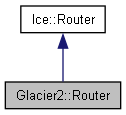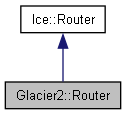The Glacier2 specialization of the Ice::Router interface.
More...
defined in <Glacier2/Router.ice>
interface Router extends Ice::Router { ... }


Operations | |
| Session * | createSession (string userId, string password) throws PermissionDeniedException, CannotCreateSessionException |
| Create a per-client session with the router. More... | |
| Session * | createSessionFromSecureConnection () throws PermissionDeniedException, CannotCreateSessionException |
| Create a per-client session with the router. More... | |
| void | destroySession () throws SessionNotExistException |
| Destroy the calling client's session with this router. More... | |
| idempotent int | getACMTimeout () |
| Get the value of the ACM timeout. More... | |
| idempotent string | getCategoryForClient () |
| This category must be used in the identities of all of the client's callback objects. More... | |
| idempotent long | getSessionTimeout () |
| Get the value of the session timeout. More... | |
| void | refreshSession () throws SessionNotExistException |
| Keep the calling client's session with this router alive. More... | |
 Operations inherited from Ice::Router Operations inherited from Ice::Router | |
| idempotent ObjectProxySeq | addProxies (ObjectProxySeq proxies) |
| Add new proxy information to the router's routing table. More... | |
| idempotent Object * | getClientProxy (out optional(1) bool hasRoutingTable) |
| Get the router's client proxy, i.e., the proxy to use for forwarding requests from the client to the router. More... | |
| idempotent Object * | getServerProxy () |
| Get the router's server proxy, i.e., the proxy to use for forwarding requests from the server to the router. More... | |
Detailed Description
The Glacier2 specialization of the Ice::Router interface.
Operation Documentation
◆ createSession()
| Session* createSession | ( | string | userId, |
| string | password | ||
| ) | throws PermissionDeniedException, CannotCreateSessionException |
Create a per-client session with the router.
If a SessionManager has been installed, a proxy to a Session object is returned to the client. Otherwise, null is returned and only an internal session (i.e., not visible to the client) is created.
If a session proxy is returned, it must be configured to route through the router that created it. This will happen automatically if the router is configured as the client's default router at the time the session proxy is created in the client process, otherwise the client must configure the session proxy explicitly.
- See also
- Session
- SessionManager
- PermissionsVerifier
- Returns
- A proxy for the newly created session, or null if no SessionManager has been installed.
- Parameters
-
userId The user id for which to check the password. password The password for the given user id.
- Exceptions
-
PermissionDeniedException Raised if the password for the given user id is not correct, or if the user is not allowed access. CannotCreateSessionException Raised if the session cannot be created.
◆ createSessionFromSecureConnection()
| Session* createSessionFromSecureConnection | ( | ) | throws PermissionDeniedException, CannotCreateSessionException |
Create a per-client session with the router.
The user is authenticated through the SSL certificates that have been associated with the connection. If a SessionManager has been installed, a proxy to a Session object is returned to the client. Otherwise, null is returned and only an internal session (i.e., not visible to the client) is created.
If a session proxy is returned, it must be configured to route through the router that created it. This will happen automatically if the router is configured as the client's default router at the time the session proxy is created in the client process, otherwise the client must configure the session proxy explicitly.
- See also
- Session
- SessionManager
- PermissionsVerifier
- Returns
- A proxy for the newly created session, or null if no SessionManager has been installed.
- Exceptions
-
PermissionDeniedException Raised if the user cannot be authenticated or if the user is not allowed access. CannotCreateSessionException Raised if the session cannot be created.
◆ destroySession()
| void destroySession | ( | ) | throws SessionNotExistException |
Destroy the calling client's session with this router.
- Exceptions
-
SessionNotExistException Raised if no session exists for the calling client.
◆ getACMTimeout()
| idempotent int getACMTimeout | ( | ) |
Get the value of the ACM timeout.
Clients supporting connection heartbeats can enable them instead of explicitly sending keep alives requests.
NOTE: This method is only available since Ice 3.6.
- Returns
- The timeout (in seconds).
◆ getCategoryForClient()
| idempotent string getCategoryForClient | ( | ) |
This category must be used in the identities of all of the client's callback objects.
This is necessary in order for the router to forward callback requests to the intended client. If the Glacier2 server endpoints are not set, the returned category is an empty string.
- Returns
- The category.
◆ getSessionTimeout()
| idempotent long getSessionTimeout | ( | ) |
Get the value of the session timeout.
Sessions are destroyed if they see no activity for this period of time.
- Returns
- The timeout (in seconds).
◆ refreshSession()
| void refreshSession | ( | ) | throws SessionNotExistException |
Keep the calling client's session with this router alive.
- Exceptions
-
SessionNotExistException Raised if no session exists for the calling client.
The documentation for this interface was generated from the following file:
- Glacier2/Router.ice